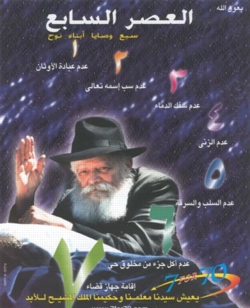 August 07
August 07
False Memory: Misusing History in the Arab-Israeli Conflict
by Roi Ben-Yehuda
p. 2 of 2
Arab oppression of Jews is not…a post-1948 phenomenon. It is rooted in Islam and has been an inescapable characteristic of the relations between Muslims and Jews since Muhammad’s time. Twentieth-century Arab persecution of Jews is only a continuation and intensification of this centuries-long tradition, in which the socially and religiously inferior Jew bore the brunt of the Muslim masses’ contempt and the Muslim government’s arbitrary policies and financial troubles.
The passage above brings to our attention another use of the counter-narrative. Namely, in the battle over the refugee question, pro-Israeli scholars have argued that, given the ill-treatment of Jews in Arab lands throughout the centuries and the fact that over half a million Jews living in Arab lands fled after the creation of Israel in order to escape persecution, it is only fair that Arab states accept an exchange of population – Palestinian refugees for Jewish refugees.
Alan Dershowitz makes a related assertion, arguing that Arabs bear responsibility for their mistreatment of Jews and other minorities throughout history. Dershowitz writes:
The Arab and Muslim nations were completely responsible for the second-class (or worse) status their religions and political leaders had imposed on their Jewish minorities over the centuries. The myth of benign treatment by the Arab and Muslim world of their Jewish minorities has been shattered by modern scholarship. The Jews were victims of an apartheid-like system…In addition to the legal and theological discrimination – the requirement to wear distinctive clothing, not to own self-defense weapons, and to pay a special tax – they were subject to periodic pogroms and blood libels, such as in Damascus in 1840.
 For Dershowitz, the wrongs committed by Muslim states, in addition to those committed by Christian states, give the Jewish people the right to settle and live as a free nation in Israel. "If rights come from wrongs," he argues "…then the wrongs imposed on Jewish minority residents of Muslim and Christian states demonstrated to the world that the Jewish people had the right to self-determination in a place in which the Jews were a majority."
For Dershowitz, the wrongs committed by Muslim states, in addition to those committed by Christian states, give the Jewish people the right to settle and live as a free nation in Israel. "If rights come from wrongs," he argues "…then the wrongs imposed on Jewish minority residents of Muslim and Christian states demonstrated to the world that the Jewish people had the right to self-determination in a place in which the Jews were a majority."
Which Past to Remember
Considering the Golden Age narrative and its counterpart, it becomes obvious that each perspective offers a distorted take on the history of the Jewish-Muslim experience. Both pro- and anti-Israeli forces claim to be speaking of the same history, yet each side draws a completely different conclusion about what actually took place. According to one argument, Jewish-Muslim history recounts a time of harmony, coexistence, and cultural interchange, while the other contends that this same period was one of humiliation, discrimination, and oppression. Somewhere in between these respective ideological claims lies a history that still needs to be properly understood independent of the desire to political repurpose the origins of the Arab-Israeli conflict.
Pro-Arab pundits must take into account that, notwithstanding all the benefits that Islam brought forth to the Jews, by today’s moral and legal standards the Jews of Islam lived as second-class citizens. They were subjected to unique taxes such as the poll tax and the land tax, while civil law imposed prohibitions that marked them as different from and inferior to their Muslim counterparts. Jews were prevented from striking Muslims, bearing arms, building or repairing houses of worship, proselytizing, and were forced to wear distinctive clothing. In addition, they experienced bouts of persecution and violence. Any writer who addresses the topic of Jewish-Muslim history without taking these issues into consideration is being negligent.
Pro-Israeli writers need to acknowledge that, in spite of their unequal status, the Jews living in Muslim societies – both in medieval and early modern times – were members of well-integrated communities. The degree to which Jews were culturally, linguistically, socially, and economically assimilated in Muslim societies is proof in and of itself that Jewish-Muslim history cannot be characterized solely in terms of discrimination and persecution. Legally, while the dhimmi (the non-Muslim citizen of an Islamic state) was subject to many prohibitions, in exchange he received freedom of religious worship, freedom of self-government, freedom of movement and settlement throughout the empire (with the exception of Mecca and Medina), freedom of occupation, and protection by the law. Again, in view of these facts, we cannot characterize Jewish-Muslim history solely in terms of intolerance.
Finally, theologically, while many quotes from the Koran and the Hadith suggest that Jews were viewed as spiritually inferior to Muslims, there are also many passages from the sacred texts of Islam that contradict this viewpoint. For example, Sura II 62 states:
Surely those who believe, and those who are Jews, and the Christians, and the Sabians, whoever believes in God and the Last Day and does good, they shall have their reward from their Lord, and there is no fear for them, nor shall they be grieved.
The Koran is a complex and contradictory text, and one cannot simply extract from it a single truncated quote, extrapolating the essence of Islamic theological attitude (not to mention practice!) towards Jews over the centuries.
A “balanced” approach to history forces us to be similarly careful in linking the past to the present, because when we acknowledge history’s complexity, it makes it that much more difficult to use it for partisan political purposes. Thus, taking both the "good news" and the "bad news" of Jewish-Muslim history into consideration, it becomes much harder to exploit the story of this relationship in order to argue either that Islamic civilization is wholly at fault, or that Zionism is the sole cause of Muslim anti-Semitism and the Arab-Israeli conflict.
Cognizance of this complex history will also help us address what needs to changed in order for coexistence actually to flourish. The history of convivencia, or coexistence, teaches us that while some history is worth repeating, we can only ignore the dark side of Jewish-Muslim coexistence at our own peril. It is precisely in recognizing and coming to terms with periods of violence, hatred, and degradation that we can begin to address some of the fundamental problems in the way in which Jews and Muslims approach each other today.
Contemporary Jewish-Muslim relations are the products of various, complex factors that cannot be reduced to a single, essential explanation. Yet when we claim that Zionism or Muslim anti-Semitism is the sole source of animosity between the two people, we reduce the Arab-Israeli conflict to a primary and weak causal description. This is as important as understanding the etiology of a disease is a key to finding its cure. A balanced approach may function as a buffer to a simple and misleading analysis. As we have seen, when it comes to Jewish-Muslim history, the question becomes which past we choose to remember.
Roi Ben-Yehuda has written for numerous publications, including Tikkun and The Epoch Times. He is a graduate of the Jewish Theological Seminary.









